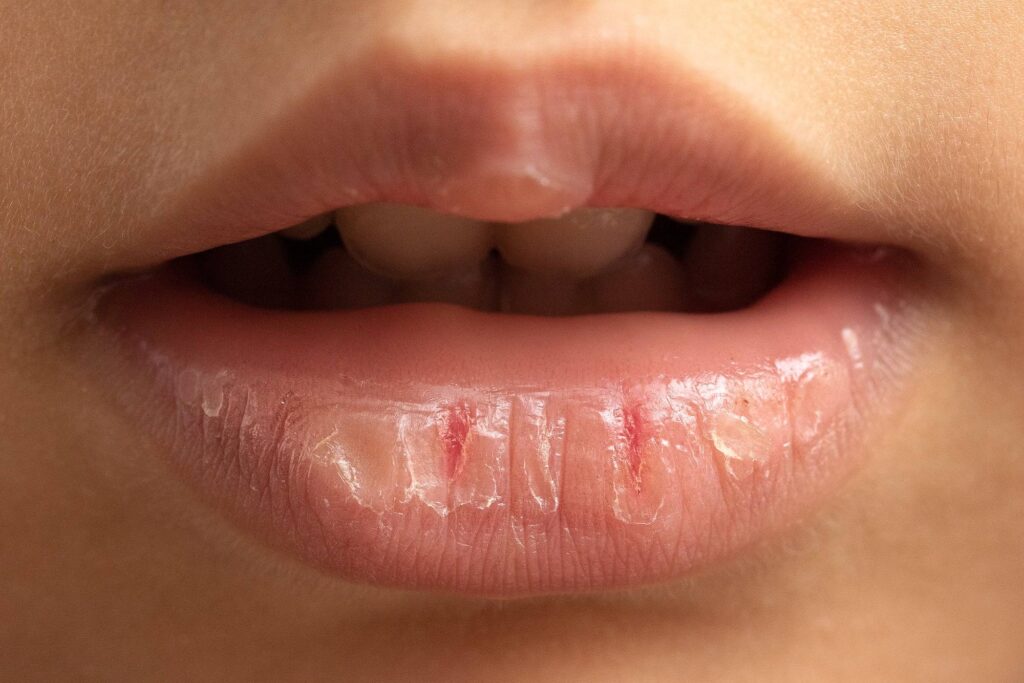The skin on the lips is thinner and more sensitive than the skin on the rest of the body, because the lips do not have oil glands, as a result, they are at risk of drying and cracking. Lips are exposed to environmental elements more than other parts of the body and may crack due to exposure to sunlight, dry or cold weather. Frequent licking of lips or dehydration can also cause dry and cracked lips.
In medical terms, cracked lips are called “cheilitis” and can be caused by contact with an allergenic substance or by certain diseases.
Different types of shale
written by Cleveland Clinic websiteThere are different types of shillite:
- Actinic chelite: repeated exposure to sunlight
- Angular cheilitis: fungal infection of the corners of the mouth
- Contact cheilitis: allergic reaction
- Drug-induced cheilitis: reaction to drugs (retinoids)
- Eczematous cheilitis: flare-up due to eczema
- Infectious cheilitis: viral or bacterial infection (herpes simplex)
- Glandular cheilitis: increased thickness of salivary glands
What is the prevalence of cracked lips?
Anyone at any age can suffer from chapped lips. Children and teenagers who often lick their lips are more prone to chapped lips. They may develop a problem called lip licking dermatitis, which leads to chapped lips as well as a rash around the mouth. People who live in areas with dry, hot or cold climates may experience frequent chapped lips. Seasonal chapped lips occur in winter and can be common in people with dry skin.
Chapped lips are dry and hard and can be very annoying. Severe cracked lips, especially when eating citrus fruits and spicy and salty foods, can cause burning and pain while eating.
What are the symptoms of chapped lips?
Symptoms of chapped lips include:
- Dry or flaky lips
- Cracking
- itching
- mild pain
- Ulcers on the lips and inside the mouth
What is the cause of chapped lips (what factors cause chapped lips?)
The reasons for chapped lips are:
- Sun burn
- Cold
- Hot or dry weather
- Frequent licking of lips
- Certain diseases (allergies, thyroid disorders, some autoimmune disorders) or reactions to medications
- Lack of vitamins and minerals (iron, vitamin B)
- dehydration
Home treatment for chapped lips
Chapped lips can be treated at home with the following methods:
- Hydration to the body
- Using lip balm or moisturizer during the day
- Refrain from licking and picking the skin of the lips
- Keeping foreign objects away from the mouth (pencils, jewelry, and metal objects)
- Using a humidifier at home
What kind of lip balm is best for chapped lips?
To treat chapped lips, choose a lip balm with the following features:
- Odorless
- Hypoallergenic (minimum sensitization)
- ointments (vaseline, glycerin)
- Oils (mineral oil or castor oil)
- Moisturizer (Ceramide, Dimethicone)
- Sunscreen (titanium oxide, zinc oxide)
Do not use lip balms that contain the following ingredients, as they can irritate chapped lips:
- Aromatic substances and flavorings
- Menthol
- Eucalyptus
- camphor
- wax
The lip balm covers the cracks of the lips and the ointment keeps the lips hydrated for a long time based on the ingredients and the concentration of the ointment. Lip balms and lip balms can be used throughout the day when you notice your lips are dry. Using lip balm at night will hydrate your lips throughout the night. Always reapply lip balm or ointment after eating and drinking. Outside the house, use lip balm or ointment with sun protection factor or SPF 30 or higher every two hours.
Bleeding from cracked lips
The skin of the lips is prone to cracking, and failure to treat it may result in bleeding, pain, and burning. You can treat bleeding lips by using special lip ointments. If the bleeding is frequent and home treatment is not effective, see your doctor to prescribe more advanced treatment.



